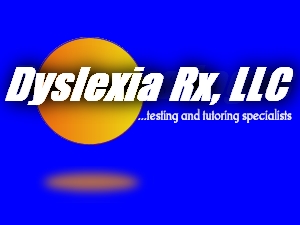
Dyslexia Rx, LLC
...testing and tutoring specialists
The Dyslexia Challenge
| Volume 1, Issue 1, 08/06/05 |
Research-based definition of Dyslexia
Dyslexia is one of several distinct learning disabilities. It is a specific language-based disorder of constitutional origin, characterized by difficulties in single word decoding, usually reflecting insufficient phonological processing abilities.
These difficulties are often unexpected in relation to age and other cognitive academic abilities. They are not the result of generalized developmental disability or sensory impairment.
Dyslexia is manifested by variable difficulty with various forms of language, often including, in addition to problems reading, a conspicuous problem acquiring proficiency in writing and spelling.
Don't Wait -- Get Help Now
Reading researchers say the ideal window of opportunity for addressing reading difficulties is during kindergarten and first grade. The National Institutes of Health state that 95 percent of poor readers can be brought up to grade level if they receive effective help early.
While it is still possible to help an older child with reading, those beyond third grade require much more intensive help. The longer you wait to get help for a child with reading difficulties, the harder it will be for that child to catch up. If help is given in fourth grade (rather than in late kindergarten), it takes four times as long to improve the same skills by the same amount.
Research Supports the Orton-Gillingham Approach
The Orton-Gillingham Multisensory Method was developed in the early 1930's by Anna Gillingham and a group of master teachers. Dr. Samuel Orton assigned Anna's group the task of designing a whole new way of teaching the phonemic structure of our written language to people with dyslexia. The goal was to create a sequential system that builds on itself in an almost 3-dimensional way. It must show how sounds and letters are related and how they act in words; it must also show how to attack a work and break it into smaller pieces. And it must be a multi-sensory approach, as dyslexic people learn best by involving all of their senses: visual, auditory, tactile, and kinesthetic.
What is taught:
- Phonemic Awareness
- Phoneme/Grapheme Correspondence
- The Six Types of Syllables
- Probabilities and Rules
- Roots and Affixes
- Morphology
Copyright © 1998 Bright Solutions for Dyslexia, LLC All Rights Reserved.
Go to Susan Barton's website at www.BrightSolutions.US
Questions or Comments? Email us at DyslexiaRx@aol.com
or call (303) 741-9246
